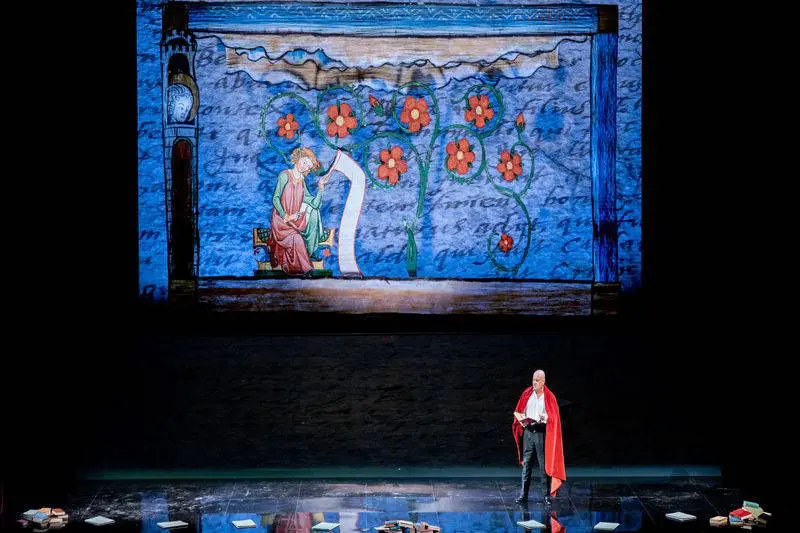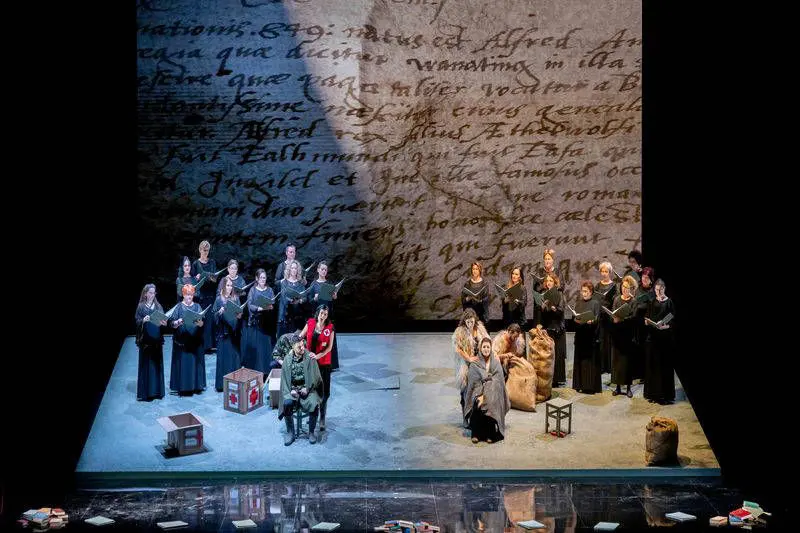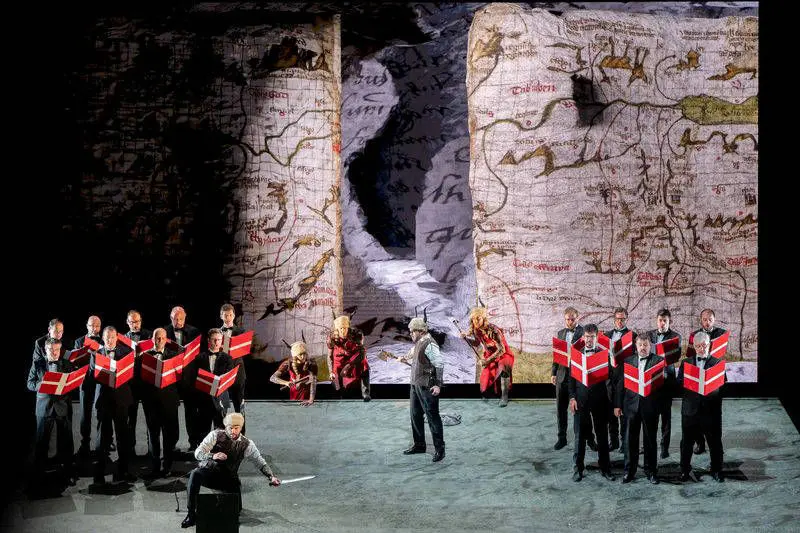















| opera |
Stage direction by Stefano Simone Pintor
"The performance is staged in semi-staged form, mainly using the screen already set up for Il diluvio universale. The director Stefano Simone Pintor thought that the entire action would take place over a large open book, of which the LED wall is a page. The scene, by Gregorio Zurla, uses few elements, a few chairs for example, and relies mainly on Virginio Levrio's beautiful projections that offer a great reflection on the relationship between history and culture. Images of illuminated manuscripts, of precious and beautiful books alternate with historical films, showing moments when culture was in danger of being eclipsed, as in the Bücherverbrennungen of May 1933. It was decided to remedy the shortcomings of the libretto by turning the discourse to a broader and more universal theme, which in the end also reflects the cultural oblivion in which this very work risked being trapped. [...] The audience, which flocked to discover this rarity in Donizetti's catalogue, decreed an authentic triumph for the entire company, which turned into a veritable apotheosis of applause at the individual performances of Fiume and Siragusa. A performance not to be missed."
"In Pintor's direction, the characters/performers move effectively within a simple scenic structure. Here too, on the same led wall as Il diluvio universale, real images appear, such as fires, destruction and the assault on Capitol Hill (with the shaman's horned headdress that we will find on the heads of the Danes!), alternating with ironic and elegant graphics that use the codes and miniatures of the time. [...] What seemed to be the least attractive show in the Bergamasque review, after a biblical drama and the French version of one of Donizetti's greatest masterpieces, is not only a lucky repechage but has turned out to be the most successful and one of the best in recent years, so much so that we are convinced that Alfredo il Grande has all the credentials to become a repertory title."
"The third opera in the programme of the Donizetti festival in Bergamo was a surprising and well-deserved success thanks to the cast led by Gilda Fiume and Antonino Siragusa, the direction of Stefano Simone Pintor, and the conducting of Corrado Rovaris. [...] It may be a fragile dramaturgy, but Alfredo il grande is a work that is linked to a close political topicality, and director Stefano Simone Pintor (with set designer Gregorio Zurla, costume designer Giada Masi, Fiammetta Baldiserri for the lights and Virginio Levrio for the videos) did well to gracefully relate it to the contemporary world. Rather than the generic good and legitimate ruler of Tottola's verses, he looks at the depth of the historical figure, the 9th century sovereign who was a legislator and promoter of literacy, translation of Latin texts into English, a cultural policy of fundamental importance for the country's development. Here then, the canonical horned helmets of the Viking barbarians are not only a tender allusion to iconographic tradition, but on closer inspection are actually replicas of the headgear of the famous 'Shaman' of the 6 January 2021 attack on Capitol Hill. In contrast, Alfredo, his wife Amalia, General Eduardo, even the peasant girls Enrichetta and Margherita with Guglielmo (here a prelate) often appear with a book in hand, intent on reading or writing.In the backdrop projections, which are effective and non-invasive, the redemption is a redemption of culture represented by refined illuminated pages, while the barbaric violence has the ignorant and pernicious guise of those who in history have burned and burn books, of wars of yesterday and today.Today we celebrate not monarchy, but civilisation, and indeed Amalia sheds her tiara and ermine to intone her final rondo."
Best AI Website Creator